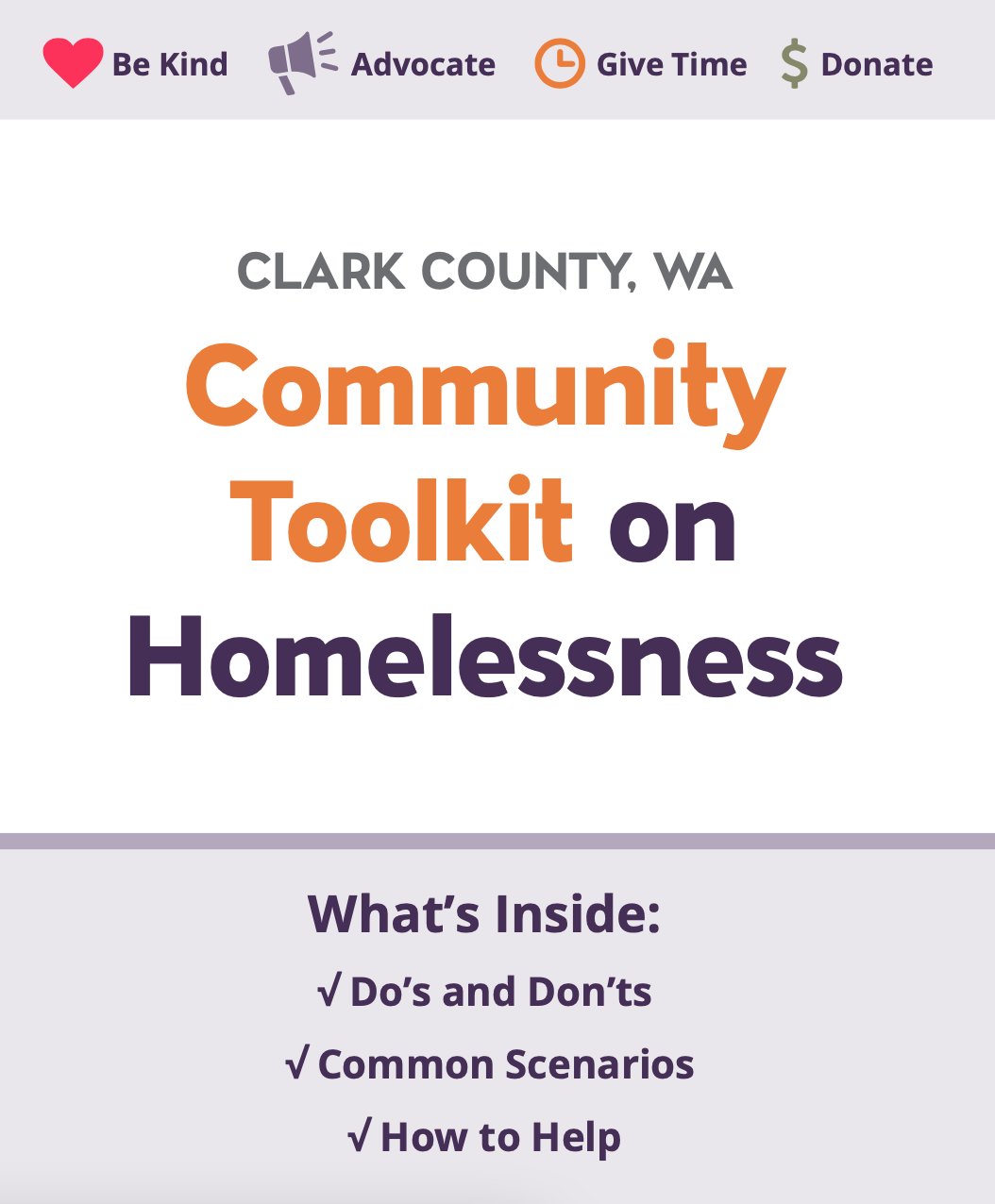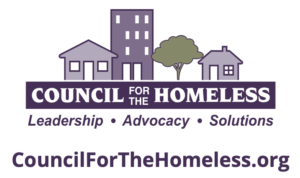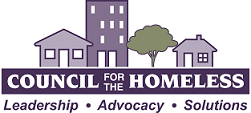- Get to know the people living on the streets in your area and treat them like any neighbor.
- Encourage/help them call public services like 211 and the CFTH Housing Hotline: 360-695-9677 (year round).
- Contact the Council for the Homeless Coordinated Outreach staff. Outreach staff build trust and help people to be safe and connect toservices. councilforthehomeless.org/contact-outreach-staff.
- Share the Council for the Homeless Resource Guide: councilforthehomeless.org/clark-county-resource-guide
What to do when you want to help a person
Keep in mind
- Clark County’s homeless service providers know how to help our unhoused neighbors. It is what they are trained to do. The Coordinated Outreach Teams represent seven agencies working together.
- Many organizations directly help people experiencing homelessness and work to increase affordable housing. Find an organization that you want to support, and ask them what they need.
- Avoid perpetuating stereotypes and myths. People experiencing homelessness are not defined by their housing status. It’s often temporary, and it is likely they sought housing and/or shelter and there was none available.
- Advocate within your circle of influence to help make things better for our unhoused neighbors.
Learn more
Attend CFTH community education webinars on homelessness topics:
councilforthehomeless.org/community-education
Sign up for the CFTH digital newsletter:
councilforthehomeless.org/newsletter
Follow CFTH on social media:


Learn more
Do
- Make eye contact and speak kindly. Be respectful. Determine how you want to engage. Your capacity to engage will vary from person to person and based on the situation at-hand.
- Contact the Council for the Homeless Coordinated Outreach staff. Outreach staff build trust and help people to be safe and connect to services. councilforthehomeless.org/contact-outreach-staff.
- If someone is being disruptive, homeless or not, de-escalate the situation if you are comfortable doing so or remove yourself from the area if possible.
- If someone is threatening harm to self or others, acting recklessly or violently, or having delusions, call the Clark County Crisis Line: 360-696-9650, open 24/7. You can also call 911.
- Let people know your boundaries on your property. If people are doing something illegal and won’t leave, call 911.
Do Not
- Assume anything about the person with whom you are engaging. They may or may not be tired, hungry, happy, sad, dealing with substance use disorder, facing a mental or physical crisis, or any number of scenarios.
- Enter into a situation you sense is out of your scope as a community member.
- Offer food, use of your phone, or money, unless you are equipped and willing to handle repeat requests.
- Permit anyone to campon your property, unless you have developed a trusting relationship with them.
- Permit any one to store personal belongings on your property.

Quick Connect: Who to Call
360-696-9650: Clark County Crisis Line for people who are in mental health crisis and do not pose imminent threat to themselves or others. Open 24/7.
360-695-9677: CFTH Housing Hotline for anyone in need of services like emergency shelter serving Vancouver and Clark County.
360-487-8626: City of Vancouver Homeless Assistance and Resources Team (HART) serving Vancouver city limits.
911: For people who are in medical distress or in a mental health crisis and pose an imminent threat to themselves or others.
Here’s what to do if you own a business:
Someone is sleeping/loitering at the front door:
- It is good to establish a cordial relationship. Introduce yourself. Ask the person their name.
- Politely ask them to leave using sincere empathetic language that deflects the request from yourself to a third party (e.g. the property owner asks them to leave, even if that person is you). This reduces the power-dynamic, and will help in future interactions.
- Let them know where they can be, as opposed to only where they cannot be.
- If they are not cooperative, refer to the Quick Connect: Who to Calland determine which number is best for the situation. Avoid confrontation and keep a safe distance if you feel threatened in any way.
Someone exhibiting mental health symptoms has walked into your business:
- Exhibiting mental health symptoms does not necessarily lead to dangerous and disruptive behavior. If they purchase something, treat them like any other customer. This sets a great example for your employees and patrons. If they do not make a purchase, let them know the area is for customers, and politely ask them to leave.
- If they are symptomatic and disruptive: Ask them to leave clearly and politely. Your safety, and the safety of your patrons is your priority. If they remain in the facility call the Clark County Crisis Line or appropriate number from the Quick Connect: Who to Call list. Based on the situation, you may want to call 911 if the situation feels dangerous.



